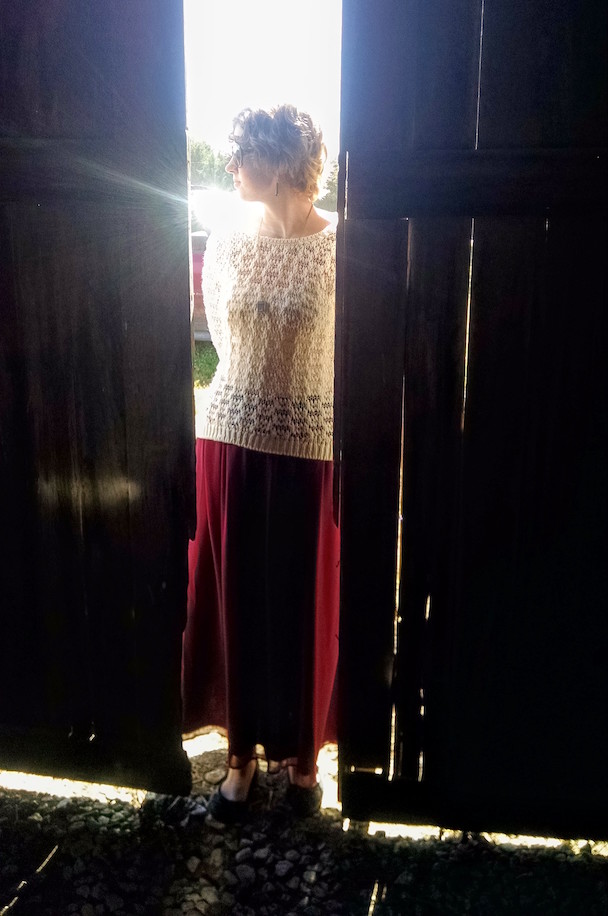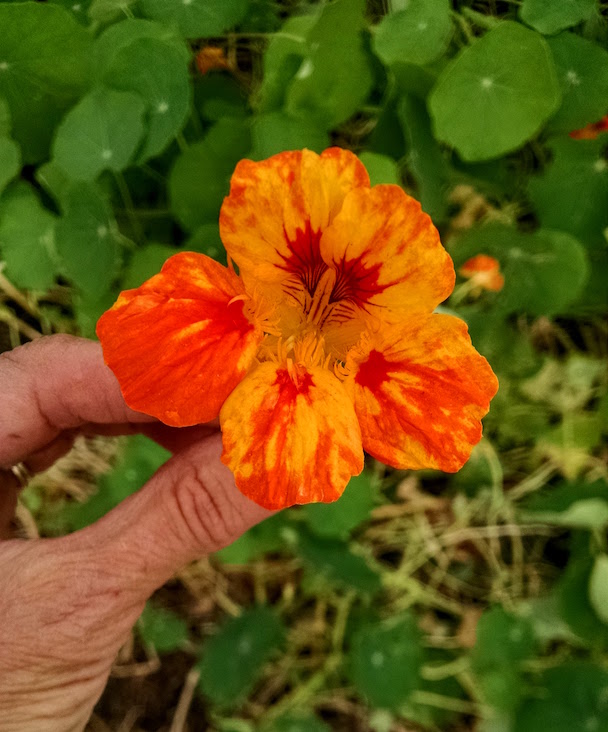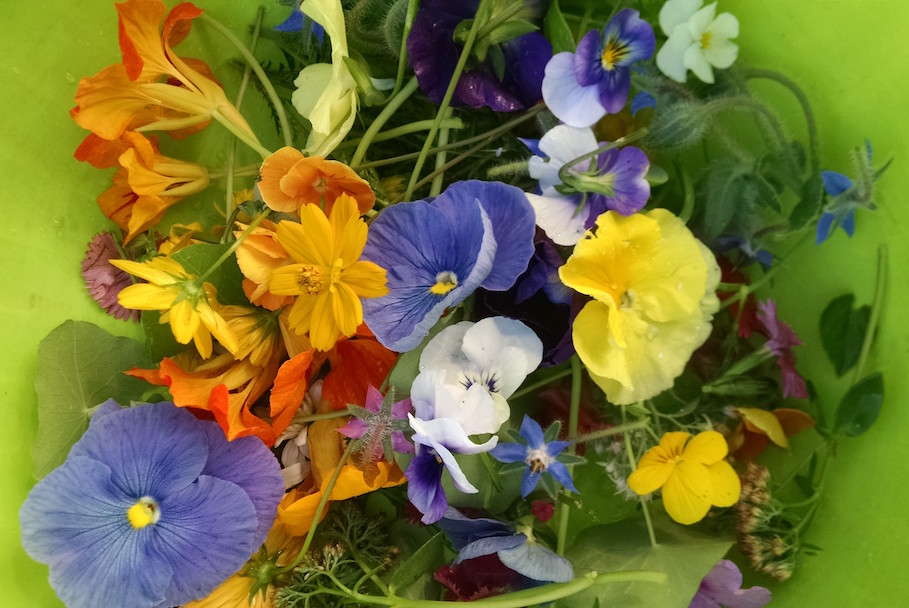What we’re reading at our place, and a tiny bit about plate-juggling

Yup, it’s the way we roll around here: Amalia hangs around old picturesque barns, looking enigmatical and picturesque herself, in formal wear. (No pictures of me. I was in work clothes.)
It has been awhile since I’ve written a post about what we’re reading at our place, because *gulpereenies!* I haven’t been reading much. This is not something I like to admit (frankly) because, personally, I think reading is very important, especially–yikes!–if you’re a writer. Or a thinker. Or a doer. Or a teacher. And I mean BOOK-reading, not IG-post-reading, or news-on-the-cell-reading. But life sticks its foot in, quite often, between me and a beloved stack of books.
It probably does the same to you. But hopefully not for too long.

The nasturtiums in the hoop house have thrown me for a delightful loop, getting prettier and prettier as we inch toward frost. Growing these beauties is one thing that has kept me very busy this summer.
You understand, don’t you? You–dear gentle reader–get it: how it is that you are doing your thing on life’s stage–let’s say it’s juggling plates–you are a famous plate juggler, hooray!--and you are putting on your show and you are surprised at how GOOD AT IT you actually are. And yet . . . it’s a big, big show, with a huuuuge audience, and you are doing the best you can for as long as you can do it, and then–inexplicably–that long hooked cane comes out from the wings, and —whoopsy!–pulls your feet right out from under you.
And since you haven’t read a book in awhile, you can’t remember what inexplicably means. Just kidding. 🙂
You fall. Your plates crash around you. You duck your face. You are crushed and embarrassed. You shed a few angry tears. You are disappointed in yourself. You thought you could keep everything going up there in the air forever, but no. You don’t waste time in self-pity. At least, not much. You pick up your plates (at least the ones still unbroken), you get your feet back underneath you, and you begin to juggle again, this time with fewer plates (hello, half of them broke) and with a bit more humility. You brush away tears of frustration; you square your shoulders and you simply make the best of things.
This summer was that, for me. I’ve been juggling too many plates, but as the days get shorter and I spend more time inside, I’m slowly catching up on the inside stuff. The outside stuff will get nipped by frost and blessedly covered in a thick blanket of snow before we know it. And that, my friends, is actually okay with me. I’m letting a few plates fall.
For example! I actually tore down half of my tomato cages last week, though there were still a few tomatoes hanging on them–!! At least a week or two before a killing frost, mind you! (Imagine Maxwell Smart’s voice here: “Would you believe it?”)

A bowlful of edible flowers, picked early one morning to fill an order.
Mack and Amalia and I started school a few weeks ago, and that has helped me slow down enough to pick up a book, too. Sitting down in the daytime is not something that I’ve done much this summer–except on my bike!–but it feels good now.
God is good. He gives us strength to make it through, even sometimes only one blessed day at a time. He gives blessings too rich for us to even comprehend. And he gives us readers reasons to rejoice day after day.
I’m going to turn over part of this blog post to my beautiful daughter Amalia, who actually isn’t addicted to being outside as I am, so she reads plenty of books in all seasons. She has a book collection that you would not believe. Her room is in the basement, and I do believe if a devastating natural disaster came (God forbid!) and the house fell down, her room–with its stacks and bookcases and piles of books–would be the safest place to go. Such fortifications there!
So I will start this list, and I’ll let my capable, smart-alecky, bookish daughter finish it. 🙂 Here we go!
What I’m reading
Airs Above the Ground, by Mary Stewart
I was having trouble getting into a book–any book!–earlier this fall, and my daughter Bethie (who has more wisdom than she ought to, for her tender years) suggested that I just start with a book that I had read previously, something that I really liked, to break my head back into book-reading after taking a long seasonal break from it. I thought it was good advice, so I chose this one:
By the way, if you purchase books–or anything at all!–from clicking on these affiliate links, the merchant will kindly give me a tiny monetary reward, though the items will not cost you a red cent more. Cool, huh? So–support your humble blogger!–use the links! And thank you!
Have you discovered Mary Stewart yet? She writes wonderful mysteries set in interesting locales around the world: smart, clever mysteries, always with a romance interwoven into the story. I discovered Stewart in my high school and college years, when I read her excellent Arthurian trilogy, and I proceeded to plow through every book she wrote, and then I felt very sad indeed that she didn’t write more. I love learning about new areas of the world from her books, and I enjoy it that every chapter begins with a clever quote from classic literature that relates to the action in the chapter.
This book has to be my favorite of all Stewart’s writings, and the most memorable to me. The famous Lippizaner stallions are major characters in the book, and I was so entranced by learning about them that when they happened to be performing in a town near us one summer, Bryan took me to see them.
Spoiler alert: the scene with the old horse on the hillside gives me chills and brings tears to my eyes every time I read it, or even think about it! Excellent comfort read that will make you just a little sad.
The Margaret Rudkin Pepperidge Farm Cookbook, by Margaret Rudkin
(The dedication page reads: “TO HENRY, the most patient man in the world.” Isn’t that lovely?)
Oh, I do hope that you all have library used book sales in your areas of the world, and that you take advantage of them. For those of you to whom this is a new concept: libraries in our area regularly weed out books that are under-borrowed, or whatever, to make room for new ones. They also receive many donations from patrons of books that they no longer use. All this results in a beautiful glut of books–many not worth the mention, but several full of promise. Once a year (or sometimes, happily, more) they trundle out all these unwanted books, put up a donation jar, and set book-crazy folks loose on them. The kids and I lucked out and hit three of these wondrous events this summer. 🙂 🙂 🙂 We brought home quite a haul (guilty laugh) from each one.
I can’t believe how many true treasures that we’ve discovered at these sales. Like this cookbook. Beautifully illustrated and written with a comfortable, humorous voice, it is surely destined to be one of my favorites. I do love to sit down and read a good cookbook, don’t you?
The author Margaret Rudkin, of course, was the founder of Pepperidge Farm, and one of the great business leaders of her time. Her grandmother taught her how to cook, beginning with biscuits and cakes. She has a very interesting story, by the way, but that’s another post.
Here are the enigmatical chapter headings:
- Childhood
- Country Life
- Pepperidge Farm
- Cooking from Antique Cookbooks (ironic)
- Ireland
If you love cookbooks, you probably need to add this one to your collection! There are recipes for every type of occasion, and stories, and very sweet illustrations done in pen and ink and watercolor throughout.
WHY DID THE CHICKEN CROSS THE WORLD? The Epic Saga of the Bird that Powers Civilization, by Andrew Lawler
I have this friend. Her name is Jo. EVERYBODY ought to have such a friend. Now and then I’ll receive a heavy package in the mail, and I’ll recognize the handwriting. Mack always hoots “It’s from Mama Jo!” (he loves her, too) and we do a happy dance. We’ll know that it’s something very nice. Quite often it’s a book, or even several books. Or something nice to eat. Yep. I know that I’m blessed, folks.
This is the latest gift that my friend sent me. Inside was this note:
“I saw this and couldn’t help myself! <3 Jo” 🙂
The message of this book: don’t underestimate the world-changing importance of the lowly chicken. Forget the dog, by the way, as being man’s best friend. Journalist and author Andrew Lawler mixes science with history to bring about this fascinating and entertaining tale of man’s true best friend: the chicken.
Consider that the humble barnyard (and many times, backyard) chicken has served the needs of humans much more than the horse, the dog, or the cow. The chicken has served us through the ages, providing nutrients, medicine, entertainment, an alarm clock, and the source of the world’s most popular joke.
This book is an engaging, beautifully-written exploration of an important, but (until now!) neglected major player in our history. I am a chicken person from way back, and I adored learning so much more about some of my absolute favorite critters. After you read this book, you will never think about chickens the same way again!
NATURAL COLOR, Vibrant Plant Projects for Your Home and Wardrobe, by Sasha Duerr
Oh my. I almost didn’t pick this book up when I first saw it, because I knew . . . I knew I’d get sucked into it and suddenly want to buy ALL. THE. SUPPLIES. and set aside a special space in a room out of the way, and get to work doing the MOST FUN THING EVER, which is to say dying fabrics into beautiful colors, using natural things like onions and flowers and stuff from your compost pile. (Honest, just another reason to keep a compost pile!).
But. I resisted the unnatural (and fleeting) surge of self-control, and picked up the book. And I didn’t look up again for an hour or more. The book is full of gorgeous photos of subtle natural dyed fabrics, and really tantalizing projects, too. The author, an artist and a professor, starts the book with a thorough explanation of the process of fabric dying (I’m not a scientist and it didn’t scare me away) and the supplies you need to collect. Then she writes through the seasons, giving examples of natural items that you can gather to experiment with your own fabric dying.
For example, the fall dye plants that are listed are: green persimmons, yellow onion skins, lichens, black beans, madder root, black walnut hulls, and sunflower seeds. I could find most of these natural things within a half-mile of my house, and so my appetite to start playing around with natural dyes is definitely whetted . . . !
(I did buy a big white cotton sheet at a thrift store the other day, too, so I’m nearly ready . . . !!)
What Amalia is Reading
The Most of P.G. Wodehouse, by P.G. Wodehouse
From Amalia:
I have always loved Wodehouse, and when I found this collection of his stories at one of my favorite used bookstores, I snatched it up asap. It has stories I’ve never even heard of before: the Mr. Mulliner stories, The Drones Club, Quick Service: The Complete Novel. . . I haven’t gotten to Quick Service yet, but I love the Mr. Mulliner stories. As much as Jeeves and Wooster, even.
“In these days when almost everybody is on some sort of diet it is rarely that one comes across the old-fashioned type of diner who does not worry about balanced meals and calories but just squares his shoulders and goes at it til his eyes bubble.”
Ella Minnow Pea, by Mark Dunn
I just started reading this sweet little book, and I love it so far. It’s a quick read, but very clever. It follows the story of a fictional island where words, letters, and writing are very important to the inhabitants, but as tiles slowly drop from the plaque on the statue of their founder, the letters themselves are outlawed.
As you read, you’ll notice that the characters stop using certain letters. At first nothing big–a ‘Z’, a ‘Q’, but when it gets to ‘D’, life starts getting harder and harder for them. I love how the author makes up new words, and mixes in words you don’t typically hear much, too–and as they go on, they have to be more and more creative with the words they use! I delight in words, and it is a little bit of a puzzle too, so this just makes me happy. . . and makes me want to write something similar.
“Hundreds of words await ostracism from our functional vocabularies: waltz and fizz and squeeze and booze and frozen pizza pie, frizzy and fuzzy and dizzy and duzzy, the visualization of emphyzeema-zapped Tarzans, wheezing and sneezing, holding glazed and anodized bazookas, seized by all the bizarrities of this zany zone we call home.”
Great Expectations, by Charles Dickens
Great Expectations is not my favorite Dickens book. This one isn’t one I would listen to on my MP3 player over and over again, like I did Oliver Twist. I think my main problem was with Pip–and it’s never good to have a problem with the main character–for I just kept thinking how horribly ungrateful he was. But granted, the adventure was captivating (’tis Dickens, after all), and there were some twists in the plot I did not expect in the least. And many of the minor characters I really did like–and even the characters I didn’t like were interesting. Miss Havisham wasn’t a person I’d want to know, for instance, but she was a fascinating, rather awful character.
“I loved her against reason, against promise, against peace, against hope, against happiness, against all discouragement that could be.” — Great Expectations, by Charles Dickens
- 7 New Pepper Varieties from this year’s garden that I love to the moon
- Herbicide Drift: Public Enemy #1 to your heirloom tomato plants









I wish that they were as easy to get here in Mexico as in the states. Each trip north I visit Goodwill and pick up two or three but that must last me until my my next trip. I do have a nice collection on kindle but it’s not the same as holding an actual book as you read it.
OH Chef, I’d love to share with you. Stop by!
I have to confess as well, I haven’t done much reading either during the summer but I plan to start as soon as the tomatoes are processed. I purchased the Pepperidge Farm cookbook way back in the 70’s and I still have it in my library, thank you for the reminder, I’m gonna have to pick it up and have a look again.
Absolutely, Elsa!